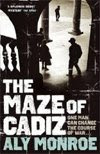In the end I chose the latter. Part of growing up is working out what suits you. But my past interest also explains why I am occasionally struck by admiration for – or doubts about – a performance I see.
I should be clear here. I admire an actor like Bruno Ganz. I have been a fan since the wonderful Marquise of O, Eric Rohmer’s version of Heinrich von Kleist’s short story. Ganz is probably most famous now for his portrayal of Adolf Hitler in Downfall, a version of Hitler’s last twelve days in a Berlin bunker.
It is hard to conceive of what he went through to play this role. Raging, banal, pathetic –the performance is also good for what it does not do. There is no poetry, no mad grandeur, no catharsis. In short no MacBeth.
But there are some horrendously revealing moments. For example when Magda Goebbels, brilliantly played by Corinna Harfouch, decides to kill her children because she cannot bear the thought of them living in the world that is coming. She doesn’t quite look at what Hitler has been reduced to, but shifts her eyes just a little towards the bunker wall as she spouts loyalty to the ‘dream’ that was.
This projection or third element in a scene is very powerful.
Yesterday I was reminded of this when I heard someone mention the reaction to Meryl Streep’s performance as Margaret Thatcher in Iron Lady. The gist was that nobody had attacked Bruno Gantz for playing Hitler, and that some of the reactions were against the ex-prime minister herself.
Like the speaker I was not living in the UK when Mrs Thatcher was in power. I do remember members of the Miners’ Union visiting Spain to raise funds during the famous strike. And I know my father loathed her.
Worse, I haven’t even seen the film. I have however – it is hard to avoid – seen various clips of what is at the least a remarkable piece of mimicry on Ms Streep’s part.
Now one of the reasons for my father’s dislike was Mrs Thatcher’s manner and voice. He regarded them as hectoring and affected. This has something to do with British political and social history. Edward Heath had done something similar - that is, acquire a tone and enunciation that, say, Sir Alec Douglas-Home had not had to acquire. Heath and Thatcher had both, as it were, stepped up from fairly modest beginnings to a fruitiness beyond that of mumbling toffs. A few years later Tony Blair – and many others – would go the other way and shed the sounds of privilege.
So I was struck in the clips by Meryl Streep’s third element – Mrs Thatcher’s own projected view of who she was and what she represented. I don’t know that it will win her an Oscar. Viola Davis has also portrayed an aspect of American social and political history in The Help.
Yes, I played Viola in Twelfth Night too.







No comments:
Post a Comment